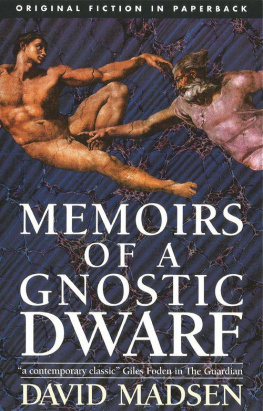David Madsen - The Memoirs of a Gnostic Dwarf
Here you can read online David Madsen - The Memoirs of a Gnostic Dwarf full text of the book (entire story) in english for free. Download pdf and epub, get meaning, cover and reviews about this ebook. year: 1997, publisher: Dedalus, genre: Detective and thriller. Description of the work, (preface) as well as reviews are available. Best literature library LitArk.com created for fans of good reading and offers a wide selection of genres:
Romance novel
Science fiction
Adventure
Detective
Science
History
Home and family
Prose
Art
Politics
Computer
Non-fiction
Religion
Business
Children
Humor
Choose a favorite category and find really read worthwhile books. Enjoy immersion in the world of imagination, feel the emotions of the characters or learn something new for yourself, make an fascinating discovery.
- Book:The Memoirs of a Gnostic Dwarf
- Author:
- Publisher:Dedalus
- Genre:
- Year:1997
- Rating:3 / 5
- Favourites:Add to favourites
- Your mark:
- 60
- 1
- 2
- 3
- 4
- 5
The Memoirs of a Gnostic Dwarf: summary, description and annotation
We offer to read an annotation, description, summary or preface (depends on what the author of the book "The Memoirs of a Gnostic Dwarf" wrote himself). If you haven't found the necessary information about the book — write in the comments, we will try to find it.
The Memoirs of a Gnostic Dwarf — read online for free the complete book (whole text) full work
Below is the text of the book, divided by pages. System saving the place of the last page read, allows you to conveniently read the book "The Memoirs of a Gnostic Dwarf" online for free, without having to search again every time where you left off. Put a bookmark, and you can go to the page where you finished reading at any time.
Font size:
Interval:
Bookmark:

Spirto ben nato, in cui si specchia e vede
Nelle tue membra oneste e care
Quante natura el ciel tra no pu fare,
Quand a null altra suo bellopra cede:
Spirto leggiadro, in cui si spera e crede
Dentro, come di fuor nel viso appare,
Amor, piet, merc cose s rare ..
Che mafurn in belt con tanta fede:
LAmor mi prende, e la belt mi lega;
la piet, la merc con dolci sguardi
Ferma speranz al cor par che ne doni.
Qual uso o qual governo al mondo niega
Qual crudelt per tempo, o qual pi tardi,
C s bel viso morte non perdoni?
( Michelangelo: Sonetto XXIV )
It is not necessary for me to relate precisely how these memoirs fell into my hands; suffice it to say that in addition to a sound academic reputation, I also have a private income.
What it most certainly is necessary to say however, is that the task of translation presented its own peculiar difficulties. I have tried to overcome these difficulties by maintaining throughout the text a fairly contemporary and therefore accessible idiom; many of the expressions which Peppe uses in his fifteenth and sixteenth century Italian for example are virtually untranslatable, and I have taken the liberty of replacing them with modern equivalents. This is particularly so in the case of vulgar expletives. When he uses puns or double entendres , I have applied the same rule of thumb: where it is translatable I have kept to the original, and where it is not I have substituted. It is in this way that I have attempted to preserve the esprit of the memoirs, which is, by and large, somewhat salacious.
There are several portions of the text (mainly songs, poems or quotations) which I have left untranslated Peppes own song for example, Ulrich von Huttens bilious little political ditty, and snippets of private letters because I considered it would be a great pity to lose the unique flavour of the original; even to one who does not speak Italian, the radiant beauty of Nel Mio Cuore will be obvious. In any case, as our little friend himself points out all translations are to some degree or other interpretations .
The fragments of Gnostic liturgies were written down by Peppe in the Original Greek, but it seemed to me that they should be given in English in this edition of the memoirs, and this has been done; the reader need not be unduly concerned however, since they are for the most part incomprehensible in either (or any) language. There can be little doubt that Peppes adherence to Gnostic teaching was total and unreserved, yet even he admits in his apologia pro philosophia sua that much of its written expression (especially the invention of fantastic titles and grotesque honorifics) is but a prolix attempt to identify the Unidentifiable. To anyone who might be interested in learning more about the historical development of Gnostic rites and liturgies, I would wholeheartedly recommend Professor Tomasz Vinkarys epoch-making tome, A Study of the Valentinian Sacramentary in the Light of Gnostic Creation Myths , which has recently been reissued by Verlag Otto Schneider of Berlin in co-operation with Schneider-Hakim Publications, London.
There are many individuals to whom I owe a debt of gratitude for their invaluable help in the preparation of these memoirs, but I feel I must make particular mention of the following:
Herr Heinrich Arv, who supplied me with much invaluable information on the incidence of sexual perversion in Renaissance Italy; Monsignore Marcello Ciapplino, for his elucidation of those parts of the original text which deal with military and political history; and Dottoressa Patrizia Cezanno, who painted a portrait of Peppe using the description he himself gives in the memoirs, which now hangs in my private library.
The reader may care to know that Giuseppe Amadonelli died on 6th August 1523, the Feast of the Transfiguration, whilst attending Solemn Vespers in the church of Santa Maria in Trastevere, Rome. The precise cause of death remains unknown.
David Madsen
London, Copenhagen, Rome
Clementissime Domine, cuius inenarrabilis est virtus
This morning His Holiness summoned me to read to him from St Augustine, while the physician applied unguents and salves to his suppurating arse; one in particular, which was apparently concocted from virgins piss (where did they find a virgin in Rome?) and a rare herb from the private hortus siccus of Bonet de Lattes, the popes Jewish physician-in-chief, stank abominably. Still, it was no worse than the nauseating stench of the festering pustules and weeping ulcers adorning His Holinesss cilicious posterior. (Everybody refers to these repulsive afflictions as a fistula, but I am not constrained by the self-interest of tact.) With his alb pulled up over his hips, and his underdrawers down around his ankles, the most powerful man in the world lay sprawled on his bed like a catamite waiting to be well and truly buggered.
He has been buggered, plenty of times hence the state of his arse. His Holiness prefers to play the womanly role, thrashing and squealing beneath some musclebound youth like a bride being penetrated for the first time. Not that Ive any personal objection to such behaviour Leo is the pope after all, and short of publicly declaring that God is a Mohammedan, he can do exactly as he pleases. Besides, I like to think of myself as a tolerant man. I find it easy to overlook weakness and vice in a field of human activity which holds no interest for me whatsoever. Even if it did, I imagine it would take someone with a very peculiar vice indeed to find anything sexually attractive about a crook-back dwarf. Which is what I am.
Hence the title of these reminiscences of mine: Memoirs of a Gnostic Dwarf . I think this is an excellent title, since it is utterly honest: I am a Gnostic dwarf, and these are my memoirs. It occurs to me that there are a great number of books and manuscripts offered for sale these days whose claims are entirely meretricious, such as Being a True Account of a Monks Secret Pleasure , or A Full and Satisfactory Explanation of the Practice of Greek Love both of which I have seen in His Holinesss personal library, and neither of which are in any way true, full or satisfactory; you shall not be likewise misled in these pages. It is painfully evident to everyone that I am a dwarf, but my Gnostic proclivities remain my little secret and that of a certain private fraternity. Yes, there are more of us Gnostics I mean, not dwarves. Later, I shall speak of the fraternity in detail.
His Holiness Leo X, Roman Pontiff, Vicar of Christ on Earth, Patriarch of the West, Successor to the Prince of the Apostles, Holder of the Keys of Peter and Servant of the Servants of God, does not usually call me to read to him while he is having his rump anointed with virgins piss and rare herbs; on the contrary, he likes to be alone with his physician, and one can well understand why. I was therefore a little surprised to receive the summons. However, reflection on the matter suggests that he is disquieted by the latest news from Germany, where a choleric friar called Luther has been stirring up trouble, ranting and raving about the corruption of the papal court, and it may be that he finds the misanthropic rhapsodies of the holy bishop of Carthage distract him. To speak personally, I find them tedious in the extreme. The papal court is corrupt, but what of that? Everyone expects it to be. Its been corrupt for so long, no-one can remember a time when it wasnt, nor conceive of it ever not being so. To speculate on the whys and wherefores, as this Luther seems to be doing, is like asking why the sun is hot or why water is wet, and trying to make them otherwise. Futile. Vanitas vanitatum . The trouble with people like our fractious friar is that they think theyre a cut above everyone else, and thus ideally qualified to put the world to rights; but the world never can and never will be put to rights, because it is hell. (Now theres a snippet of Gnostic wisdom for you.) That doesnt make me a misanthrope like our holy father St Augustine on the contrary, if this world is hell, one can only have compassion for those who are obliged to live in it and breathe its poisonous air. And above all! to teach them that there is a way out.
Next pageFont size:
Interval:
Bookmark:
Similar books «The Memoirs of a Gnostic Dwarf»
Look at similar books to The Memoirs of a Gnostic Dwarf. We have selected literature similar in name and meaning in the hope of providing readers with more options to find new, interesting, not yet read works.
Discussion, reviews of the book The Memoirs of a Gnostic Dwarf and just readers' own opinions. Leave your comments, write what you think about the work, its meaning or the main characters. Specify what exactly you liked and what you didn't like, and why you think so.













